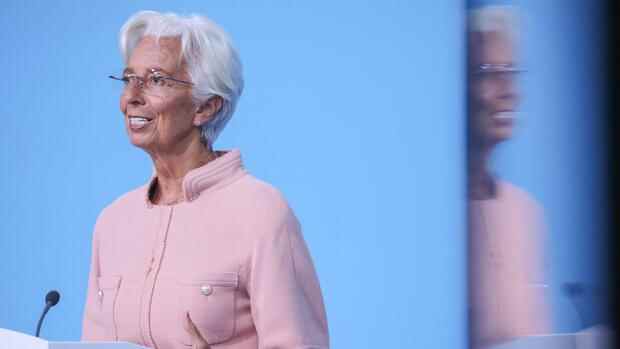Inflation has risen so much mainly because of the high energy prices.
(Photo: Bloomberg)
Brussels Despite rapidly rising prices, ECB boss Christine Lagarde clearly rejected calls for a tighter monetary policy. At a hearing in the European Parliament on Monday, she admitted that the strong inflationary surge is likely to last longer than originally thought. But there is currently no indication of a departure from the policy of cheap money.
“If we were to initiate tightening measures now, it would do a lot more damage than good,” says Lagarde. Even suggesting a tightening in the short term would hurt the euro area economy. This is on the mend and could surpass its pre-crisis level towards the end of the year.
Lagarde reiterated that a rate hike was very unlikely in 2022. However, she does not want to speculate about the key interest rate in 2023. The rate of inflation in the euro area was 4.1 percent in October, the highest it has been in over 13 years.
Against this background, Deutsche Bank boss Christian Sewing sees monetary policy being called upon to take countermeasures: “And that sooner rather than later,” he said at Euro Finance Week in Frankfurt. “The supposed panacea of the past few years – low interest rates at seemingly stable prices – has lost its effect, now we are struggling with the side effects.”
Top jobs of the day
Find the best jobs now and
be notified by email.
The ECB is keeping the key interest rate at a record low of 0.0 percent – the deposit rate at minus 0.5 percent. The money houses have to pay penalty interest if they park excess money at the central bank. From the point of view of ECB chief bank supervisor Andrea Enria, the ultra-low interest rates in the euro area are now more of a burden than it gives them advantages.
“Stolen monetary value”
At the hearing in front of the EU Parliament, MEP Markus Ferber (CSU) confronted Lagarde with the argument that citizens are gradually losing confidence if they are being “robbed of monetary value month after month” due to high inflation.
The ECB takes people’s concerns very seriously, said Lagarde. “We’re trying to get to the bottom of inflation and really understand what is driving it.” The skyrocketing energy costs alone accounted for half of the price increase, she said. The ECB is observing very carefully whether higher inflationary pressure may build up through wage growth: “So far, however, we have not seen any evidence of this in the data on negotiated wages.”
In September, the ECB’s economists had projected an inflation rate of 1.7 percent for 2022, which is expected to drop to 1.5 percent in 2023. At the next interest rate meeting in mid-December, the ECB will present updated projections that will also cover the year 2024.
In the medium term, the central bank continues to expect that inflation in the currency area will be below the ECB inflation target of two percent, said Lagarde. It has already signaled that the central bank’s trillion-dollar Corona emergency program PEPP is likely to end in March 2022. Lagarde said via video link in front of the Committee on Economic and Monetary Affairs of the European Parliament that the Governing Council would also take the Corona situation into account in its decision on the future of the program due in mid-December.
Experts speculate that the smaller ECB bond program APP will continue in one form or another after the end of PEPP. The monthly purchase volume of 20 billion euros is currently significantly lower than that of the PEPP with a huge total volume of 1.85 trillion euros.
More: The big inflation bet of the ECB – Is central bank chief Lagarde underestimating the risks?
